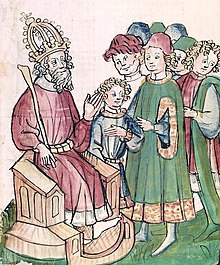Seven wise masters
Seven wise masters (Latin: Septem sapientes ) is a collection of fifteen novella-like narratives that are embedded in a framework and that was widely used from the Middle Ages to the 19th century.
Lore
The story presumably originates from Persia, where it was lost in late antiquity, but has been known as the "Sindbad Book" in translation in the Syrian and Arab countries since the 9th century. Towards the end of the 11th century, the material was probably translated into Greek by Michael Andreopulos in Melitene on the Euphrates border and subsequently known in the Byzantine Empire as the "Book of Syntipas the Philosopher". From around 1200 it was circulated in Latin translation in the West. There is evidence of literary adaptations from France since the 13th century, and German translations have been found in verse (for example Diocletian's Life , 1412, by Hans von Bühel ) and in prose since the 15th century . The prose was much more successful than the drafts. In the 16th century the text became known as a popular book ; the material was handed down into the 19th century. The earliest prose version was probably created around 1450, which is handed down as a manuscript of unknown authorship in the Codices Palatini germanici 149 and 106 ( Historia septem sapientum , see web links). Another manuscript version with illustrations by Hans Dirmstein dates from 1471.
Framework story
After the death of his wife, the Roman emperor Pontianus had his only son Diocletian educated by seven wise masters far from home. After seven years the son returns. In a vision he learned that a cruel death is imminent, which he can only avoid by not saying a word for seven days after arriving in his homeland. Therefore the son is silent at the father's court. Under the pretext of trying to make him talk, his stepmother has him taken to her room, where she tries to seduce him. When she fails, she rips off her clothes and pretends that the son has raped her, whereupon he is sentenced to death by his father. The seven wise masters can, however, delay death again and again for a day by telling exemplary stories, while the queen for her part tells stories and thus the death sentence is renewed daily. After seven speeches and counter-speeches, the seven days are up, the son can speak, now tells a story for his part and exposes his stepmother's falsehood. The emperor recognizes the intrigue and is reconciled with his son; by this the empress is condemned to be dragged through the city and burned, her lover is quartered.
literature
- Richard Benz (Hrsg.): The seven wise masters , series: Die Deutschen Volksbücher , Verlag Eugen Diederichs, Jena 1912. Special edition Druguldruck Leipzig in 200 copies, then further editions.
- Michaelis Andreopulus: Liber Syntipae. Edited by Victor Jernstedt. Voss, Leipzig 1912.
- Udo Gerdes: 'Seven wise masters' (cyclical frame story of oriental origin). In: The German literature of the Middle Ages. Author Lexicon . Edited by Burghart Wachinger et al. 2nd ed., Vol. 8, Berlin, New York 1992, Col. 1174-1189.
- Gustav A. Ritter: German humor . Berlin: Mercury, no year. P. 30 ff.
Individual evidence
- ↑ Hans Georg Beck: Byzantine Eroticon. Beck, Munich 1986. ISBN 3-406-31309-4 . P. 128
Web links
- Digitized version of the edition by Benz (Jena 1911) , Heidelberg University Library
- Digital copies of the manuscripts from Cod. Pal. germ. 149 and 106 , Heidelberg University Library
- Digital copy of the manuscript ms. qu. germ 12 University Library Frankfurt / Main
- Handwriting description
- Bibliography of the German manuscripts
- Digital copy of the print by Heinrich Knoblochtzer, Strasbourg, around 1483
- Digital copy of the print by Johann Prüss, Strasbourg, around 1478/79
